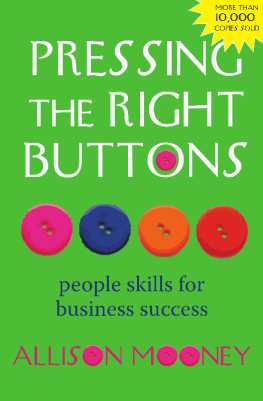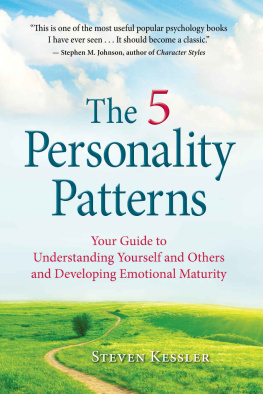Above all, I would like to thank Dr. Cal Colarusso, whom I consider a mentor figure in both my personal and professional endeavors. Whatever is right about this book, I owe for the most part to him. At its best, this work reflects his considerable wisdom.
Dr. Glen O. Gabbard inspired me in many ways. As a teacher, he captivated the residents at the Menninger Foundation with his clarity and dedication to instruction. He selflessly reviewed an ear y version of the manuscript. His book Psychodynamic Psychiatry was of immense help in providing me with the background for the personality principles. I am sure that there is much from him that permeates the text, in its better respects.
I am grateful to Dr. Arthur Terr for extensively reviewing ear y versions of the manuscript over a period of many years and constantly pushing for improvements.
Dr. Constance Dalenbergs talent completely awes me. In a brief time, she was crucial in helping to put into words the very heart and core of what I was trying to communicate. She also unflinchingly reviewed the manuscript for accuracy.
I must also thank Dr. Herbert Spohn, Dr. Robert Neveln, and Dr. Sonya Hintz, whose reviews of an ear y version of the manuscript provided valuable insight into improving it.
My agent, Julie Castiglia, recognized the popular pulse the book needed. Her frank criticism and persuasion escorted the project forward to publication.
I am also grateful to my editor, Caroline Sutton, for recognizing the potential for popular merit of the principle format and for her expertise.
CONTENTS
A Human Is a Human Is a Human
Fantasies Rule
The Unconscious Mind Is a Constant, Invisible Influence
Sociopathy Is Common
You Cant Choose Your Feelings
In Order to Comprehend More Clearly, Stand Back
Our Families Are Always with Us, Forever ...
... And What We Know of Intimacy, We Learned from Momand Dad
Much of Self-Esteem Comes from Mothers Nurturing
Those Who Dont Remember Their Childhood May Want to Forget It
The Ills of the Fathers, or Mothers, Really Are Visited upon the Children
Boundaries Define People the Way Borders Define Countries
Successful Neuroses Help People Fail
The Way People Feel About Sex Is Critical to Their Psychology
Whenever Two People of the Same Sex Are in a Room, There Is AlwaysHomosexual Tension, Even If They Are Not Aware of It
Yes, Children Do Want to be Sexual with Their Opposite-Sex Parents...
... And Electra and Oedipus Keep Psychiatrists in Business
Women Do Not Suffer from Penis Envy Nearly As Much As Men Do
Women May Feel That Physical Attractiveness Is a Passage to Securityand Fulfillment
Sometimes Sex Can Be Used as a Form of Repayment
Genital Potency Does Not Equal Sexual Potency
Intimate Relationships Are the Only Real Measuring Stick for EmotionalHealth
We Cannot Help Transferring Relationship Patterns
Aggressive Men Often Cower Around Their Wives and Girlfriends
Needy People Immediately Create Chaos in Relationships
Criticism Destroys Relationships
Shallow People Rebound Quickly, Too Quickly
Women Who Angle for Male Attention May Never Have HookedMaternal Affection...
... And Don Juan Had an Absent Father
Men Misunderstand Female Friendships Because They Arent Women
Most Women Really Do Want a Man to Protect and Take Careof Them
Too Much Love May Mean Hate; Too Much Hate May Mean Love
Total Isolation Is Never Healthy and Adaptive
History Repeats Itself, Over and Over and Over...
... But You Can Learn to Help YourselfSometimes
You Can Use Your Cortex to Master Your Limbic System
Neutrality, Though Often Desired, Is Difficult to Achieve
A Goal-Directed Focus Can Lead to Poor Results
It Is the Experience That Heals, Not Just the Insight...
... Therefore, Intimate Relationships Are Great Therapy
Marriage Is to Living Together As Apples Are to Oranges
Marriage Is Not a Happy Ending; It Is Only the Beginning...
... And It Is Easier to Say What Marriage Is Not Than What It Is
There Can Only Be One Number One in a Marriage
You Cant Change Your Spouse
Couples Tend to Socialize with Couples and Singles with Singles
Parenthood Is Not for Everyone
An Extramarital Affair Is Itself Less Important Than What Led to It...
... And Also Less Important Than What Comes After It
Kids Keep Marriages Together
Divorce Doesnt Solve Everything and Usually Introduces New Challenges
Actions Speak Louder Than Words
If You Really Want to Relate, Let People Free Associate
Asking Is More Effective Than Telling
Beware Unsolicited Denials
Defense Mechanisms May Be Inauthentic
What People Say Is Sometimes Less Important Than Why They AreSaying It...
... For Instance, We Can Tell a Lot About People by the Way They SayGoodbye
The Best Defense Is a Good Offense
Once-Traumatized People May Develop a Stubborn Need to Control
Emotions Are Harmless; It Is Behavior That Can Harm












